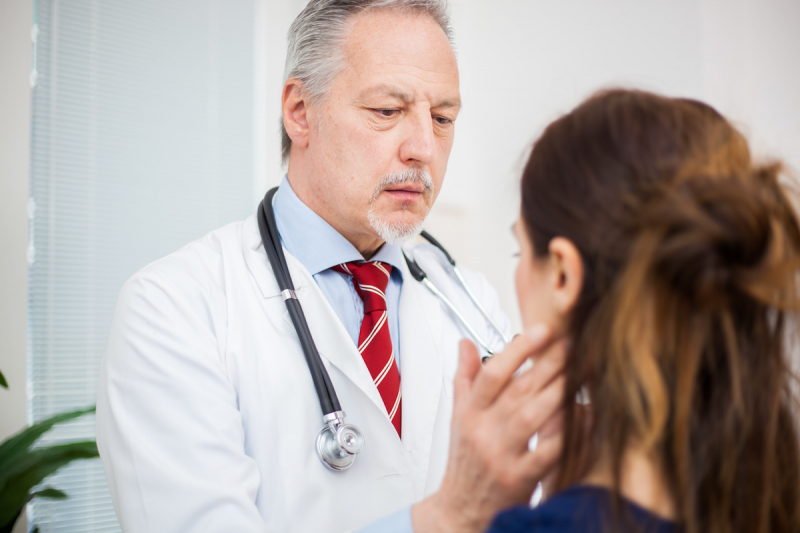Lymph nodes (also called lymph glands) are an important are part of your immune system. If your lymph nodes become enlarged or feel sensitive to the touch, that is their way of letting you know that your body is fighting an infection. In addition to that, they function as an early warning system for some types of cancer, including lymphoma, leukemia, and breast cancer.
What are Lymph Nodes?
The lymphatic system is a major part of our body’s immune system, which consists of lymphatic vessels and lymph nodes. Its primary function is to help rid the body of toxins, waste, and other unwanted materials. To do this, it transports lymph, a clear fluid containing infection-fighting white blood cells, throughout the body. As lymph flows through the lymphatic vessels, it passes through small bean-shaped filtering organs called lymph nodes. Some nodes are as large as an inch across, while others are as small as a pinhead.
Clusters of these nodes are located in various parts of your body, including at the sides of your jaws, neck and upper chest, under your arms, and in your groin on either side of the pubic bone.
If you’ve ever noticed “swollen glands” after developing an illness or infection, those are your lymph nodes working hard to defend your immune system from the waste products (such as bacteria and viruses) that your lymph system has detected.
The Connection Between Lymph Nodes and Cancer
There are two ways in which cancer can appear in lymph nodes:
- It can spread to the lymph nodes from somewhere else
- It can start in the lymph nodes
Cancer found in the lymph nodes does not always mean you have lymph node cancer. Lymph fluid carries cells around the body, therefore, cancers that start elsewhere sometimes spread to the lymph nodes. Additionally, lymph nodes can show signs of change even if the cancer has not spread to other organs. For example, if the diagnosis is breast cancer then the breast cancer cells may have traveled to the lymph system and the patient will be treated only for breast cancer.
Cancer that starts in the cells of the lymph system is called lymphoma, which is a type of blood cancer. Lymphoma can begin almost anywhere since lymph tissues are found throughout the body. There are two main types of lymphoma, which are called Hodgkin lymphoma and Non-Hodgkin lymphoma.
Hodgkin and Non-Hodgkin involve different types of lymphocyte cells. Non-Hodgkin, which can start in lymph nodes anywhere in the body, is the more common of the two. Typically, Non-Hodgkin lymphoma is diagnosed only after it’s reached an advanced stage. Hodgkin lymphoma usually starts in the upper body (armpits, neck or chest) and is typically caught earlier. Because Hodgkin lymphoma is often diagnosed early, it’s considered a very treatable cancer.
Risk Factors
Risk factors for lymphoma include age, gender, ethnicity, family history or exposure to certain chemicals, drugs or radiation. Having a weakened immune system or autoimmune disease may also increase your risk.
Signs to Watch For
Even if you don’t have any obvious illness, you should see a doctor if you have swollen lymph nodes. This is especially important if your lymph nodes feel hard to the touch, and that feeling doesn’t go away after two weeks or so. Seek medical attention with your primary care physician when swollen lymph nodes are accompanied by any of the following symptoms, including:
- Night sweats
- Fever
- Fatigue
- Coughing, chest pain, or shortness of breath
- Abdominal pain or swelling
- Bruising or bleeding easily
- Frequent or severe infections
- Unexplained weight loss
- Feeling full after eating just a small amount of food
Lymph Node Screening
Your primary care physician will feel the lymph nodes close to the surface. This checks for soreness or swelling. Many nodes, however, are too tiny or too deep in your body to be felt with the hands so additional imaging tests such as X-rays, MRIs, ultrasound or CAT scans are also used to spot any enlargement. Typically, a biopsy is also required as part of the diagnostic process. The biopsy will usually remove one or two of the nearby lymph nodes to see if they show any evidence of cancer.
If there is a strong likelihood that you are at an increased risk for developing lymphoma, or if cancer is detected by the screening test, you will be referred to an oncologist for further evaluation. To make an appointment with one of our oncologists please contact the location nearest you.
Lymph Node Treatment
After a cancer diagnosis, your oncologist will typically run tests to see if the lymph fluid shows evidence of cancer cells. These test results help identify what stage your cancer is in, which ultimately guides your cancer specialist in determining the type of cancer treatment you need, as well as how often you will need it.



